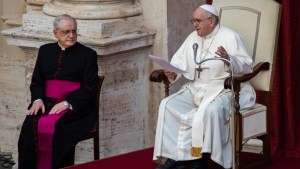Pope Francis has transferred the title of “primate of Argentina” – traditionally reserved for the bishop of a country’s oldest diocese – to the bishop of Santiago del Estero, the Holy See Press Office stated on July 22, 2024. At some point in history this honorary distinction had been awarded to the see of Buenos Aires, which was founded after that of Santiago del Estero. Santiago dates back to the 16th century.
The 266th Pope made “an important reparation in the ecclesiastical history of our homeland,” explained the two bishops of Buenos Aires and Santiago del Estero, in a joint letter published on the episcopal conferences’ website.
Pope Francis has thus made Vicente Bokalic Iglic, Bishop of Santiago del Estero, the new “primate” of Argentina, and also elevated the territory to the rank of archdiocese.
The archbishop of Buenos Aires – currently Jorge Ignacio García Cuerva – now loses this honorific title which the leaders of this diocese have held since 1936: And with good reason, the letter explained, as the first episcopal see in Argentina, created by Pope Pius V on May 14, 1570, was the Diocese of Tucumán, whose cathedral was the Church of St. Peter and Paul, located on the territory of the current Diocese of Santiago del Estero.
The historical changes
Located 1000 kilometers (621 miles) northeast of Buenos Aires, Santiago del Estero was the diocese “where the Gospel of the Lord resounded for the first time, in the voice of a successor of the Apostles [a bishop, editor’s note], in these lands whose future would be Argentina,” the letter said.
The Diocese of Tucumán included Córdoba, La Rioja, Catamarca, Tucumán, Santiago del Estero, Salta, Jujuy, Tarija and Nueva Orán. In 1699, this early diocese was incorporated into the episcopal see of Córdoba. The present diocese of Santiago del Estero was then created in 1907.
The bishops point out that Santiago del Estero has been called Argentina’s “Mother of Cities” or “Mother of Dioceses” over the centuries. “Therefore, there are many reasons to honor it as the Primate,” the letter concludes.




